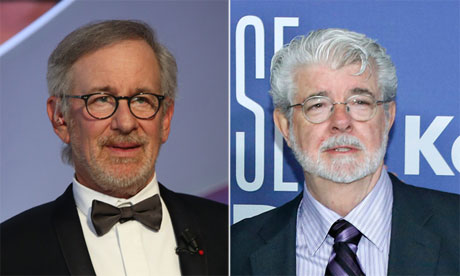Film is over one hundred years old at this point. This isn't just the creation of the medium, but the creation of the formal language that is film. However, few have a firm grasp on film. Sure, nearly everyone watches the latest blockbusters, but everyone gets film in some way- TV, commercials, just simple videos online. And now, with the internet, video is all around us, yet we really don't understand it any more than people did fifty years ago, and not even that much more than one hundred years.
Perhaps that is one of the joys of film- the fact that it is an ultimate escape. You understand it all, understand the movement of time and editing as it is presented to you. You know that it can cut and resume in an entirely different place at an entirely different time. But is simple basic literacy enough? Film can go so much deeper than basic narratives, and can be picked apart and analyzed, like literature.
Which brings me to the main comparison and point: There should be a greater movement to teach film education, like there is to increase literacy and literary appreciation. Film is all around us, and to understand it, we must know more about it. We must know its history, its uses, and its dangers. We must understand how it can be manipulated and how it can communicate ideas through complex cinematography and editing. We must learn how to understand filmic devices, like various types of montage, and how to analyze them and pull the author's intentions out.
That is what we learn in English classes. Sure, we write daily, so we must know how to write, and how to interpret writing, but now, many important messages are conveyed through film and videos. While making film is not needed, understanding and comprehension is.
Many documentaries, especially political ones, and topical drama films use filmic language to manipulate the audience into buying the message presented. This is also used in literature, and while it occasionally finds success, tricking audiences is much easier with film, which is ironic in a sense since in literature you are only required to show words, while film requires so much more input However, every aspect can be subtly manipulated, allowing the author to convey his point with ease and keep audiences in the dark in regards to the attention.
And so we are taught how to read critically. Another aspect of literary education is quality. People generally read good books. Sure, someone's going to throw a jab in about Twilight or Fifty Shades but that is a different mission. Books like that are not made with the same intention as acclaimed best sellers, and that's perfectly fine. However, I can't honestly say the majority of the most successful films are good. A large part of the reason is, and I'm really trying not to sound like a total fuck right here, is that they simply don't know better. Now, I'm not saying everything is a piece of shit and people are idiots, but I honestly believe the majority of audiences don't realize what films can do. They can do so much more than tell a simple narrative story, which most do. Sure, I love narrative film, but it is perhaps at its most interesting when it toys with the concept of story and works outside of that. Experimental(ish) literature has found great success, while experimental film has mainly received public backlash.
Sure, some people love experimental films, but most don't get them at all. And that's fine, but perhaps the best use is blending it with narrative and conventional film language. Literature that "thinks outside the box is rewarded and publicly well received because a wider audience gets it, due to literary education. If you teach people how to understand written words, but not how to read they will fall back on primitive stories, not knowing how else to communicate. And that is where film currently is.
However, the medium is still very young. The first stylistic works are about 100 years old, like the 1913 Student of Prague, which a still is shown from above. I'm not saying that the artform is dead, or decrepit or dried up, or anything of that sort. In fact, I'm saying the opposite. I'm saying that it's so young that there's so much more to be discovered. We can understand much more. Film's language will become much more complex and its history much more dense. An exciting time awaits us. However, education is essential in the advancement of anything. People must know in order to create. And perhaps that has never been more true than in film.

